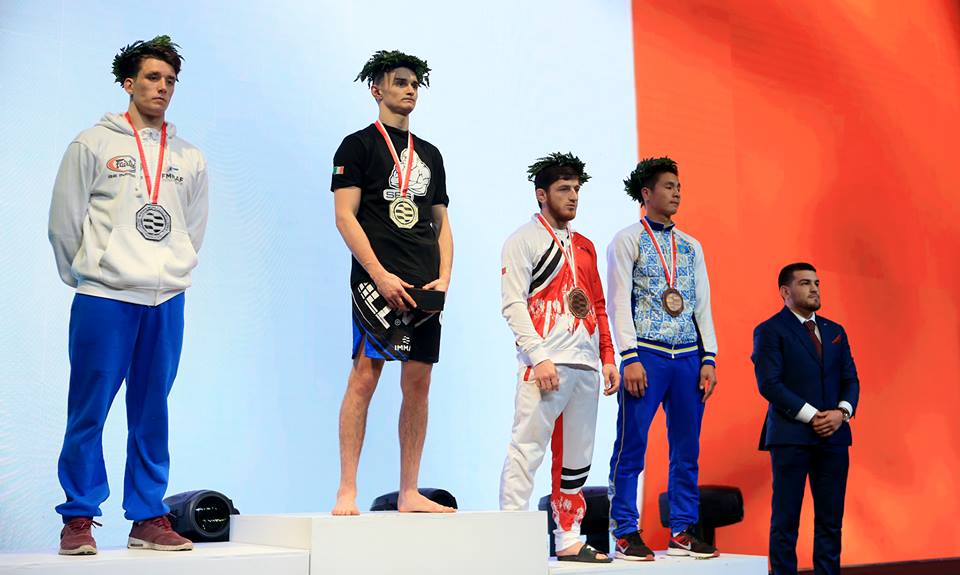Pictured: 2018 IMMAF – WMMAA World Championships – men’s lightweight medalists By IMMAF.org lead writer, Jorden Curran IMMAF chief executive Densign White has confirmed changes regarding the allocation of ranking points and medals for IMMAF – WMMAA Championships throughout 2019, with immediate effect. Moving forward, a bronze medal will be awarded to both losing semi-finalists only if the bronze medalist has won a minimum of one (1) bout to reach the semi-finals. In addition, there will be no placement ranking points awarded for a losing semi-finalist that has not won at least one bout to reach the semi-finals. As usual for all divisions, competitors will be divided into a bracket by means of a “draw.” A single elimination system is used to produce two (2) finalists, who compete for the gold medal. However, if there are only two (2) competitors in a bracket, then this will be a gold medal match with the loser receiving no silver medal and no second place placement points. The world-rankings consist of points earned from: Continental Open Championships (Europe, Asia, Africa, Oceania and Pan-America) and the World Championships. Full ranking points will now be issued only if there are twenty (20) or more countries competing at the event. If there are under twenty countries competing, then only half of the ranking points will be issued, as shown in the table below.  “We have been observing the rankings lists for some time,” IMMAF CEO Densign White explained. “It had become increasingly obvious that a lack of balance and fairness had developed where athletes and their nation, in certain events, were receiving full ranking points far easier due to lower participation than that of a more thoroughly attended championships. This created a distortion in the rankings where certain nations and athletes had climbed far higher than perhaps is warranted and in some cases without having won a single bout, due to the allocation of default bronze or silver medals and the placement points that come with medal achievements, thus effecting seeded positions and priority registration privileges. This of course is not reflective of the true standing among the international athletes and undermines the achievement of earning a medal at larger scale championships. “By awarding medals and ranking points accordingly, based on events hosting higher or lower than 20 nations, I believe we have introduced a greater level of fairness and recognition for the achievements of athletes and national teams.” Rankings points for each individual competition will continue to gradually expire, as follows: 1. In the first 12 months points will remain 100% as awarded. 2. After 12 months points will be reduced by 50%. 3. After 24 months points will be reduced to 0. 4. Athletes that change weight categories start from zero (0) points. Points and seeding positions gained in their previous weight category are not transferable, yet will remain.]]>
“We have been observing the rankings lists for some time,” IMMAF CEO Densign White explained. “It had become increasingly obvious that a lack of balance and fairness had developed where athletes and their nation, in certain events, were receiving full ranking points far easier due to lower participation than that of a more thoroughly attended championships. This created a distortion in the rankings where certain nations and athletes had climbed far higher than perhaps is warranted and in some cases without having won a single bout, due to the allocation of default bronze or silver medals and the placement points that come with medal achievements, thus effecting seeded positions and priority registration privileges. This of course is not reflective of the true standing among the international athletes and undermines the achievement of earning a medal at larger scale championships. “By awarding medals and ranking points accordingly, based on events hosting higher or lower than 20 nations, I believe we have introduced a greater level of fairness and recognition for the achievements of athletes and national teams.” Rankings points for each individual competition will continue to gradually expire, as follows: 1. In the first 12 months points will remain 100% as awarded. 2. After 12 months points will be reduced by 50%. 3. After 24 months points will be reduced to 0. 4. Athletes that change weight categories start from zero (0) points. Points and seeding positions gained in their previous weight category are not transferable, yet will remain.]]>

